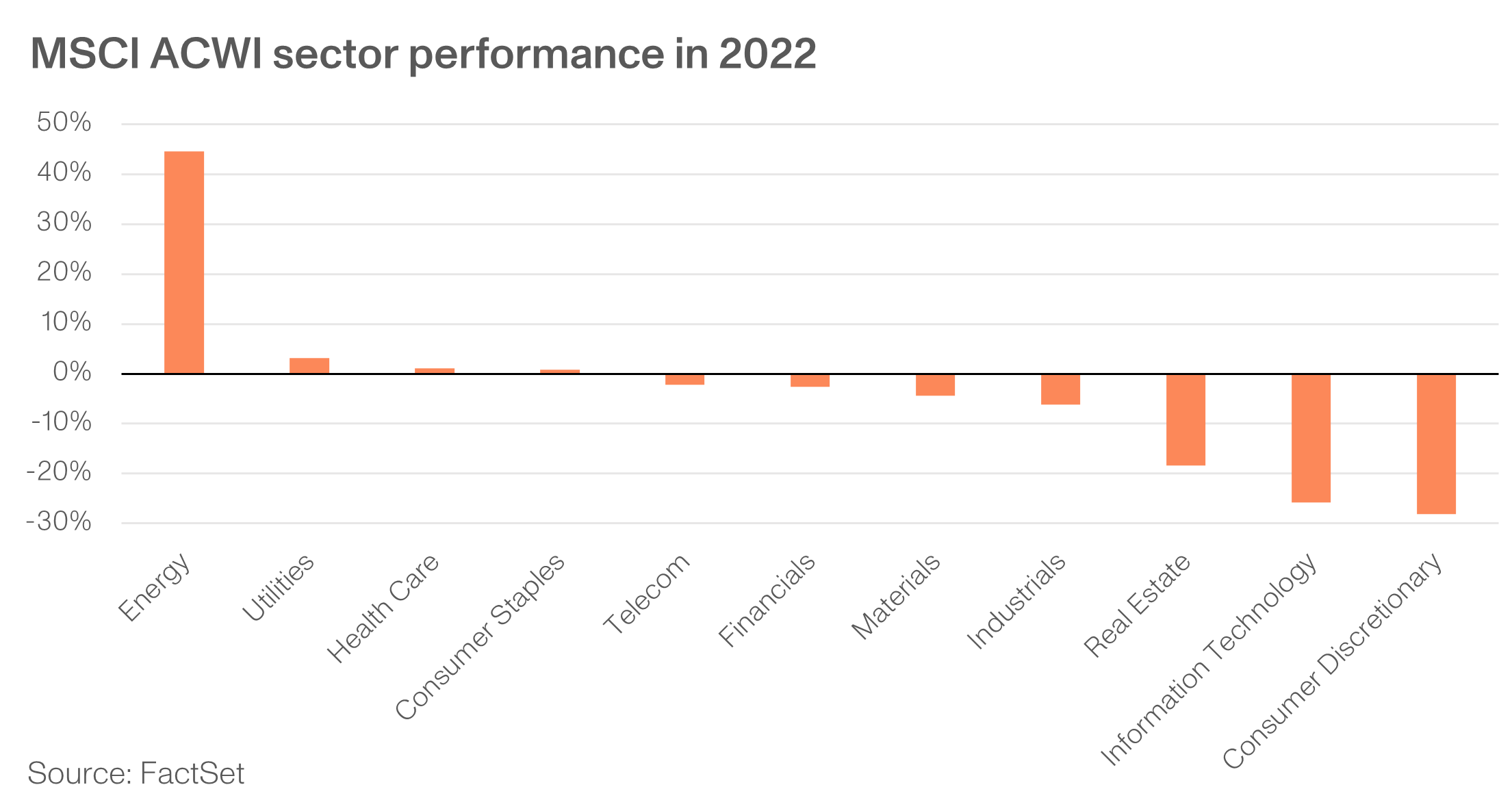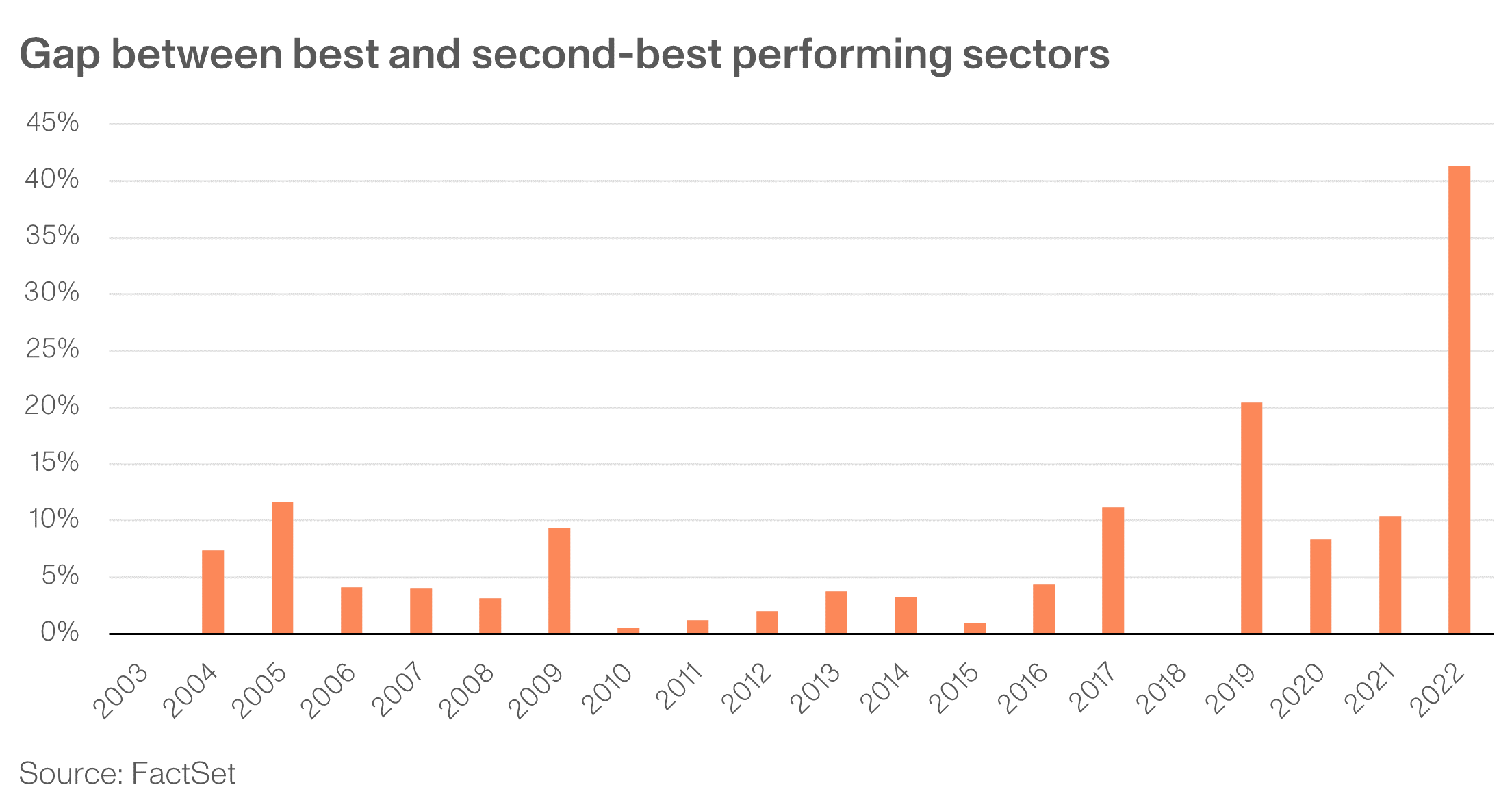What worked in equity markets in 2022
The global equity market declined by 12.7% in AUD in 2022, its worst annual return since 2008. Yet it wasn’t equally tough for all businesses.
One dimension through which to look at markets is by sector, and through this lens picking last year’s winner is easy – it was all about Energy. Energy was the best performing sector in 2022, taking the top spot for the second consecutive year. Making 2022 a particularly unusual year, Energy outperformed the second-best sector by an extraordinary 41.3%. This is starkly illustrated in the charts below.

Looking back over the last 20 years, the average difference in annual returns between the two best performing sectors was 8.0%, and the widest gap before 2022 was 20.4%.
Clearly, for many investors, 2022 was all about Energy.

Let’s rotate the lens now and take a look at what company characteristics were associated with superior performance last year.
Quality, particularly balance sheets, valuation and earnings resilience were all correlated wtih outperformance last year.
Conservative balance sheets mattered once again in 2022
For a roughly 15-year period, from the onset of the GFC in 2008 to the re-emergence of inflation in 2022, we have lived in a period of ultra-low interest rates. This created the impression that debt is almost free, even to risky borrowers, and would be forever.
Debt, or financial leverage, is like the speed with which you hit a speed bump. At 20 km/hr your car will be fine; at 80 km/hr your car will get rattled but be okay; while at 140 km/hr you’ll cause it permanent damage.
The rise in interest rates in 2022 was a reminder of the value of conservative financing. Of all non-financial companies globally, 18% have a ratio of debt to EBITDA greater than 4x.
This group of companies underperformed the broader market in 2022 by 14%.
Valuation
From early 2020, when central banks sharply lowered interest rates in response to the onset of the pandemic, we went through a period when richly valued businesses markedly outperformed. That party ended as interest rates rose over 2022 and the importance of valuation reasserted itself.
Companies whose P/E multiples exceeded 50x at the beginning of 2022, which accounts for about 20% of the broad universe of international companies, underperformed the market average in 2022 by 22%.
There were also valuation risks hiding beneath the surface in businesses trading on seemingly low multiples of earnings, but where the earnings themselves were bloated due to pandemic-related spending, such as in consumer electronics and home improvement sectors. Once the COVID-19 boost to earnings disappeared, prices relative to earnings were much higher than they had appeared.
Companies whose earnings had increased by 100% or more over the prior two years accounted for 27% of all global companies.
This group underperformed the market average by 8% in 2022.
Resilient earnings proved valuable in 2022
Highly cyclical businesses whose earnings turn negative during periods of economic stress present investors with additional risks. The underlying value of these companies may decline in such times due to management error. These unforced errors can happen when management chooses to cut headcount, investment or customer service levels to protect near-term earnings, but in a way that damages the company’s long-term competitive position and earnings potential.
25% of the 3000 largest companies globally have reported a loss in at least two of the last 15 years.
This group of businesses underperformed the market average in 2022 by 10%.
What this means for 2023
In some important respects, 2022 was a normal year. The company characteristics that investors were best served avoiding last year have been reliably associated with underperformance over a long period of time. Let’s take them in turn.
- Balance sheet quality – companies with net debt/ EBITDA >4x have underperformed in 13 of the last 15 years, by an average of 6.9%.
- Valuation – companies trading on a PE of >50x have underperformed in 12 of the last 15 years, by an average of 6.0%.
- Resilient earnings – companies that have lost money in two or more of the prior 15 years have underperformed the market in 10 of the last 15 years, by an average of 2.0%
We believe that in 2023, investors should once again avoid these characteristics, and instead choose companies with strong balance sheets and resilient earnings trading on modest PE multiples.
How we reflect this in the Aoris portfolio
The Aoris portfolio owned no Energy companies in 2022 and we never will, yet we managed to do slightly better than the benchmark last year. We own conservatively financed, consistently profitable, growing businesses trading on what we consider attractive valuation multiples. Like to learn more? See our 2022 Annual Letter to Investors.
Never miss an insight
If you're not an existing Livewire subscriber you can sign up to get free access to investment ideas and strategies from Australia's leading investors.
And you can follow my profile to stay up to date with other wires as they're published – don't forget to give them a “like”.
1 topic

